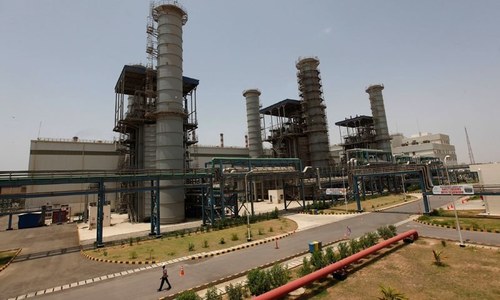ISLAMABAD: Overruling the petroleum division’s objections to looming losses to its companies, the federal cabinet has approved doing away with the condition of “minimum 66 per cent take-or-pay commitment of RLNG (re-gasified liquefied natural gas) for three Punjab-based mega power plants” to earn better privatisation proceeds and scale down power sector liabilities of over Rs2.15 trillion.
The petroleum division has put on record that without a budgeted subsidy, the decision will “simply be transferring circular debt from power division companies to petroleum division companies and in fact increasing it”.
A senior government official told Dawn that a meeting of the cabinet presided over by Prime Minister Imran Khan had endorsed a majority view of the elected members of the Cabinet Committee on Energy (CCoE) to relieve three LNG-based power projects of 1,220-1,230MW each of the guaranteed 66pc LNG purchases from Sui Northern Gas Pipeline Limited (SNGPL) and Pakistan State Oil (PSO) which have 100pc guaranteed commitments for LNG purchases from Qatar and private suppliers.
Move aims to earn better privatisation proceeds, scale down power sector liabilities of over Rs2.15tr
However, the cabinet directed the power division to provide year-head consolidated annual production plan (CAPP) for the four RLNG-based government power plants (GPPs) — Qaid-i-Azam thermal plant, Punjab thermal plant, Balloki plant and Haveli Bahadur Shah plant — based on principle of economic merit order dispatch per grid code. It also accepted a power division’s demand that CAPP once finalised would be a firm RLNG demand of the power sector subject to upward revision, if required. The power sector may divert the consolidated off-take to any RLNG power plant based upon the system requirement.
Any actual downward deviation from CAPP shall be subjected to net proceed differential to be borne by the power division. However, any upward revision of CAPP would be met by SNGPL on a best effort basis. The power purchase agreements (PPAs) and GSAs of all the four power plants would be amended accordingly, particularly those of Balloki and Haveli Bahadur Shah would be amended prior to their privatisation.
The power division had reported that as part of the circular debt mitigation plan, the change in contract structure of the LNG-based power plants was proposed to make electricity cheaper and significantly reduce the circular debt build-up in the coming years. It said the GPPs had become uneconomical than local coal, local low pipeline quality gas and imported coal due to lower power demand, transition of generation mix towards cheaper and indigenous resources and addition of efficient and low variable cost fleet of the plants. Also, the upcoming addition of nuclear and renewable plants would further reduce the overall unit cost of national pool and lead to underutilisation of GPPs.
Moreover, “if these trends in prices, as well as currently load forecast remain unchanged, the existing minimum guaranteed off-take of 66pc for three RLNG plants would yield in the loss of approx Rs143bn up to 2023”. The situation would further aggravate in FY2024 and beyond because of commissioning of committed generation plants.
On the other hand, the petroleum division reported that the losses to be faced by oil and gas companies (about Rs100bn per annum for many years) due to a change in GPPs contracts would be significantly higher than savings in the power system. It said the decision to end GPPs commitments was being taken “while completely ignoring the financial implications on the part of entire RLNG supply chain considering back-to-back agreements attached with the transaction”.
It said the Economic Coordination Committee of the cabinet had reaffirmed in November 2019 that “all the existing arrangements of RLNG power plants will remain intact until the date when Price Review Clause under the LNG Sales Purchase Agreement (SPA) takes its effect in year 2026 which is the 10th anniversary to the first Qatar Gas LNG supply made in 2016”.
The petroleum division said the decision to relieve the GPPs of LNG agreements would shift the entire exposure to PSO and Pakistan LNG Limited (PLL). If this entire amount of LNG brought for RNLG plants (185mmcfd for four plants and totaling 740mmcfd) is sold to other consumers, the total loss created in the LNG chain will be larger than the savings being projected by the power division for not taking 66pc take-or-pay at three plants.
“Essentially, without funding this loss as a budgeted subsidy, we will simply be transferring circular debt from power division companies to petroleum division companies and in fact increasing it,” the petroleum division said, adding that from a governance point of view, shifting of this loss to PSO or SNGPL through a government decision was not legally tenable.
It pointed out that SNGPL was already facing non-recovery of Rs77bn against diversion of RLNG to the domestic sector in last two winters on government directions. Subject to adequate demand, the estimated financial implications of diversion of the minimum guaranteed 66pc (366mmcfd) RLNG volumes to other sectors would be about Rs100bn per year. This is more than double the savings being projected.
In addition to the exposure on the take-or-pay, there is exposure on the terminal charges since gas companies have signed terminal agreements with Engro and Pakistan Gasport terminals for 4.5 million tonnes per annum (600mmcfd) each for 15 years. SSGCL has provided $40 million SBLC (standby letter of credit) to Engro and PLL $22m to Gasport and involved liquidity damages in case of LNG supplies variation.
The cabinet has consented to the CCoE’s advice that the petroleum division should take all mitigation measures to reduce the cost impact on the gas sector and avoid build-up of liabilities and the government will fund any revenue shortfall for the publicly listed companies, if required.
Published in Dawn, September 28th, 2020















































Dear visitor, the comments section is undergoing an overhaul and will return soon.